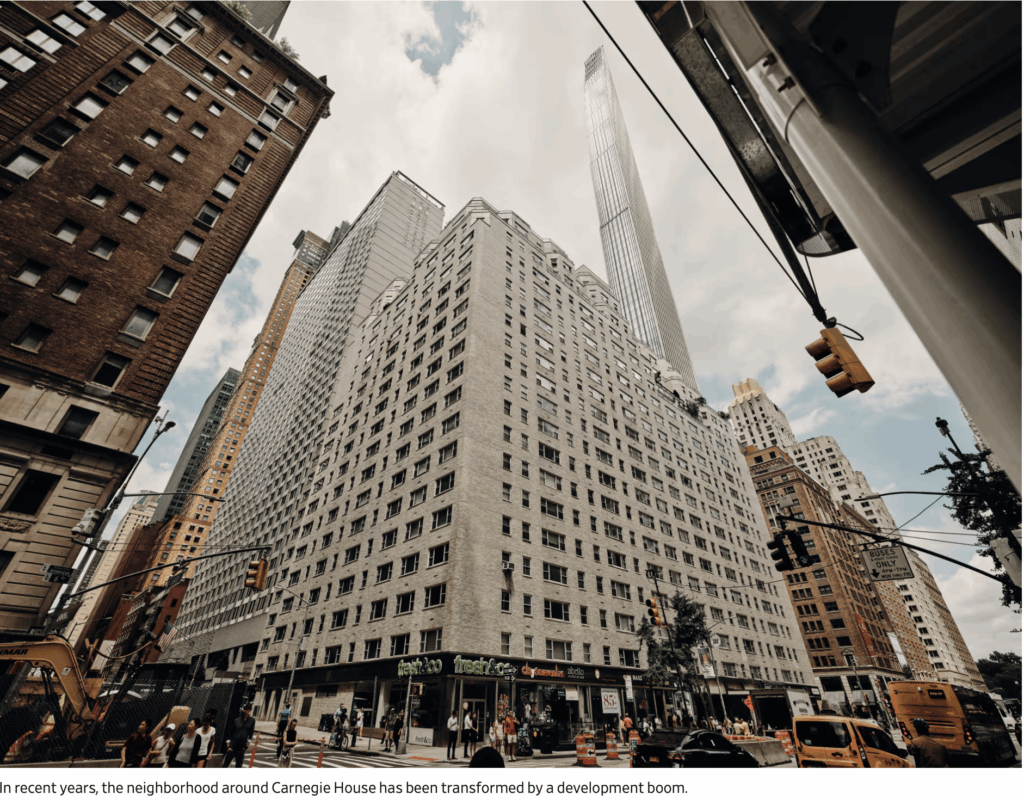Time to read [6 minutes]
- Land Owners Take The Long View In Acquiring A Future Assemblage
- Co-op Apartments Subject To A Ground Lease Have Lower Prices And High HOAs
- The Periodic Land Value Resets Tend To Force The Co-ops Into Default
After going heavy metal rock and roll yesterday, it’s now time to be wonky, so here goes. The land under a co-op apartment building, when owned by someone other than the building owner, has a lot of value on its own, and that’s not just theory. It’s helpful to consider that land “appreciates” and the improvements on it “depreciate.” Back in May, I wrote a piece on ground leases that garnered a lot of interest and is part of the deconversion narrative, returning a co-op or condo to its original rental status. This week, there was an insightful Wall Street Journal piece on the downside of a ground lease battle: A 450% Rent Hike Hangs Over One of the Last Affordable Buildings on Billionaires’ Row. That 450% refers to the ground rent the corporation pays to the landowner. Typically, every 30-40 years, the value of the land under a co-op building subject to a ground lease is reappraised (called a reset), and a pre-determined formula – usually 5-7% of the value – is used to calculate the annual payment for the ground lease. In a 99-year lease, this reset could happen 2-3 times, with the land value skyrocketing at each multi-decade reset.

What Happens If The Co-op Corporation Defaults On The Ground Lease?
If the monthly maintenance payments are higher than what the apartment would rent for, it effectively has little to no value. Even investors won’t purchase the apartment for cash if the monthly HOA is more than the achievable rental value. The co-op corporation makes the ground lease payments to the landowner, with the cost allocated across all shareholders within each of their monthly maintenance payments.
My basic understanding is that if the co-op corporation defaults on the ground lease, the building reverts to a rental property, and the landowner takes over the building. Eventually, the landowner is able to tear down the building to build something new, which is usually the end goal of ground lease takeovers. It’s a long-term play, typically spanning 20-30 years, but given the value and scarcity of land and assemblages, developers often adopt a long-game approach.
A while back, I did some pro bono work for a group of co-op shareholders at Carnegie House, the subject of the WSJ story, who were trying to figure out how to buy the land under the building from the landowners. The situation appeared hopeless due to the immense size of the numbers and the modest means of the occupants.
The Manhattan Ground Lease Universe
Co-ops outnumber condos 3 to 1 in Manhattan, but they are a rounding error in the national picture. Aside from New York City’s 85% of the co-op housing stock, Washington, D.C., Baltimore, Berkeley, and Minneapolis are locales where they can be found. In fact, Watergate is a co-op. However, co-ops that are subject to ground leases are a relic of a past era in the context of all co-ops in NYC, but their looming resets are akin to time bombs.
Prices in co-ops subject to ground leases tend to be significantly lower than those of unencumbered properties because the monthly maintenance (HOA) fees are often extremely high, and financing availability is limited. The only recent deconversion success story (co-op to rental) I am aware of occurred about a decade ago at Trump Plaza, where the shareholders engineered a purchase of the land off the books (the co-op corporation did not buy the land; the shareholders did so individually). I spoke at their shareholders’ meeting after being hired by their board. Leadership in the building was sophisticated and figured out how to make it work.
Here is a sample of co-op buildings where we periodically appraise apartments.
- 100 West 57th Street (Carnegie House)
- 303 East 57th Street (The Excelsior)
- 150 East 61st Street
- 301 East 63rd Street
- 190 East 72nd Street
- 24 Fifth Avenue
- 210 East 36th Street
- 420 East 51st Street
- 575 Park Avenue
- 215 East 96th Street
- 333 East 91st Street
- 50 Gramercy Park North
Buying A Co-op In A Ground Lease Building
Typically, there are three layers of payments to be made by an owner of a co-op apartment in a building subject to a ground lease in the following priority:
- payment to the land owner by the co-op corporation
- payment of the underlying mortgage of the co-op
- payment of the mortgage of the co-op apartment.
The mortgage on the individual co-op apartment is in third position (riskier than a second mortgage or home equity loan), which is why it is more difficult to obtain if financial circumstances become tight. Many banks will not lend on buildings subject to a ground lease, which is another reason why prices tend to be lower, forcing cash purchases.
Final Thoughts
With the lack of affordable housing (housing for the middle class), co-ops subject to a ground lease tend to be substantially lower in price and viewed as more affordable at first glance. However those sales come with a lot of “hair” on them such as the periodic reset of the land value which tends to dramatically skew the monthly maintenance charges a lot higher. It’s a tiny submarket getting a bigger look during the current affordability crisis and the surge in the value of land.
The story at Carnegie House is a good example of the end game for owners of the land when buildings exist on it.
The Actual Final Thought – For what its worth.
[Podcast] What It Means With Jonathan Miller

The Technology And The Housing Hype Cycle episode is just a click away. The podcast feed can be found for all three platforms we use are here:
Apple (Douglas Elliman feed) Soundcloud Youtube
Did you miss the previous Housing Notes?

Housing Notes Reads
- Palm Beach’s Ultra-Luxury Market Is Simmering as Other Florida Markets Cool [Mansion Global]
- Where the wealthy are moving now [New York Post]
- Decoded: 5 things brokers can do to increase walk-in traffic
- Palm Beach real estate bustled 'with remarkable resilience,' Q2 sales reports show [Palm Beach Daily News]
Market Reports
- Elliman Report: Long Island Sales 2Q 2025 | Miller Samuel Real Estate Appraisers & Consultants
- Elliman Report: Hamptons Sales 2Q 2025 | Miller Samuel Real Estate Appraisers & Consultants
- Elliman Report: North Fork Sales 2Q 2025 | Miller Samuel Real Estate Appraisers & Consultants



![[Podcast] Episode 4: What It Means With Jonathan Miller](https://millersamuel.com/files/2025/04/WhatItMeans.jpeg)